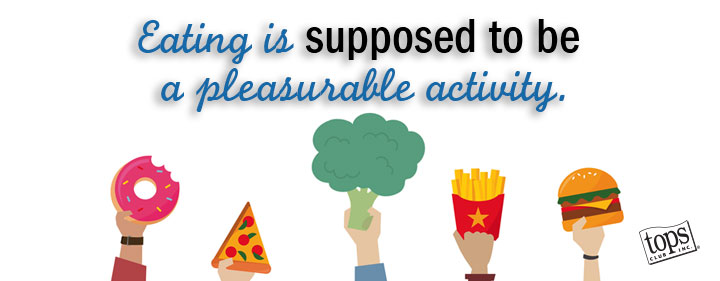 “I can’t believe I ate the whole thing!” Have you ever slivered a pie to death?
“I can’t believe I ate the whole thing!” Have you ever slivered a pie to death?
Many of us eat at times when hunger is not the primary driver. Yet, food has come to serve many functions, in addition to meeting that most basic need state: signaling the requirement of fueling the furnace. Depending on the rate at which we burn food energy, actual hunger occurs on a fairly predictable schedule and has some easy identifiers that signal us. The longer we prolong refueling, the more we ignore the message and the more insistent the signals become. Eating too little, starving ourselves, going too long between meals and skipping meals entirely can definitely mess with our metabolism, diminishing the rate of burn in some cases.
Ideally, a good meal ought to begin with the hunger stimuli being the primary reason to partake. As Dr. Michelle May says in her book on this topic, ask yourself, “Am I hungry?” In his research on the mindless side of the eating equation, Brian Wansink pointed out that in any day, the average person makes about 200 food decisions. Many of these are triggered by signals other than hunger. These may well come from emotional needs, media like commercials, proximity and availability of foods, the behaviors of others and other triggers. While I may have been hungry, it may not have been for nutritious food.
Let’s grab our notebooks and jot down some personal preferences to steer us toward safer feeding grounds. In each area, jot down things to heighten your awareness to guide you toward mindful eating:
- Respect what you know and use that wisdom to consciously decide if eating is the answer you are seeking. Jot down how you are feeling and how the food is helping you deal with the issue.
- Choose foods that delight your taste buds while nourishing to your body. Use all your senses to explore, savor and taste.
- Acknowledge responses to food likes and dislikes without judgment. Pick the best and leave the rest. You do not have to eat bad food.
- Learn to be aware of physical hunger and satiety cues to guide your decision to begin eating and to stop eating. You do not have to be a member of the “all gone or no dessert” club.
- What are your strongest triggers to eat that have nothing to do with food? What needs is the food meeting in each instance?
- Eliminate distraction. Sit down, slow down, make the food last and appreciate every bite. Eating is supposed to be a pleasurable activity.
I Care, Barb











By Barb Maas May 24, 2020
My pandemic eating has to stop. I see several people resumed journaling so I think I’ll start that as well. My overeating is stress based but as things are slowly easing up, I’m trying to get back to mindful eating. I’ve started making unique meals to break the boredom routine & that helps. Headed into Moroccan Tagine cooking … simple veggies with small amounts of meat slow cooking. I’m trying to make eating well as special as eating unwell. Boy, that is hard to do!! 🙂 Overeating has honestly added to my stress but I’m hoping I can turn that around. A friend emailed me this morning about all she’d gotten done already today & she is losing weight so I’m going to follow her example & do the same. (eating while Netflixing is deadly! ) LOL Good luck everyone. What would we do without Barb Cady’s incredible inspiration. She really help me.
By missy l. April 14, 2020
Great post. In the last 2 days your words prompted me to evaluate the power of mindfulness as it relates to eating behavior. I discovered unfortunately that I value, cultivate, and use mindLESS eating as a great protective shield. This magnificent shield releases me of all accountability for not only food consumed but also identifying and actually DEALING with food triggers. My time has come to awaken and rip that shield apart. Thanks again.
By Beverly M Fillers April 14, 2020
Thank you for Manage Emotional Eating. KOPS 3 years and this time without Weigh Ins is hard. Staying home with all this available FOOD. But this article was awesome and hit the Spot.
By Betty Douglas April 14, 2020
I used to eat when something upsetting happened. I started realizing that It wasn’t really hungry. I would eat everything mindlessly. During this pandemic, I’ve come to the knowledge that I’m not hungry, like I seemed to be. So, I end up eating much lighter. Smaller portions, just to make sure I stay healthy.
By Phyllis E. Yeck April 14, 2020
Actually doing well. Lots of warm water, only eating when hungry and balanced meals. Am doing better than when life was so hectic. Taking time to think about what I’m eating and using what’s in the cupboard, etc. Will be happy when this is over and can see all my TOPS friends.
By Sylvia Duncan April 13, 2020
I like your expression “safer feeding grounds” That will remain with me. I shall add the word “tastier” to it as well. Just yesterday I asked myself why I was still eating something that was tasteless. Thank you for your insights.
By Margaret McNutt April 13, 2020
I started journaling today everything that I put in my mouth. By doing that, I ask myself twice if I really want that to eat!! I may be bored (I am in my 70’s) but I want to come out of this pandemic a TOPS winner!!